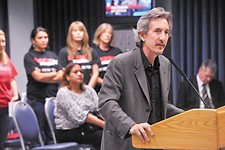A Lesson in Bilingual Education
AISD and Jewish-Arab Education group share experiences
By Richard Whittaker, Fri., Oct. 9, 2015

Sometimes Austin schools seem impossibly divided. Sometimes it takes an external reminder that many people have it far worse. Last week, a delegation of Israeli educators, representing one of the few groups teaching Arabs and Jews in the same classrooms, visited to study how the Austin Independent School District bridges gaps through bilingual education.
The idea for the visit came in July, when representatives of local teachers' union Education Austin attended the American Federation of Teachers conference in Washington, D.C., where they met staff from the Hand in Hand Center for Jewish-Arab Education. Founded in 1997, the group runs public schools that teach all Israeli kids in a community, be they Arab or Jewish. Schools Network Director Ayelet Roth called their campuses "an alternative way of education, which gives them chance to see that there is a possibility of living together. ... We don't think the kids have the responsibility to solve the mess that the adults caused in the Middle East, but we see education as a tool of change."
The original purpose of the Austin trip was to study bilingual education, but it became a broader fact-finding expedition about American schools, and American teachers. There were some raised eyebrows about how highly structured American classrooms are, especially at lower grades, but Hand in Hand Director of Education Inas Deeb was impressed by the overall institution when it comes to helping educators. She said, "A teacher is not alone, they are supported within the school, and they have rich resources that we lack back home."
Education Austin Vice President Montserrat Garibay called their five-day visit "an amazing experience to share with them best practices or what dual language is, what pre-K is. When they talk to teachers, it's amazing to see that, even though you're in different countries, you share the values that you want the kids to be bicultural and bilingual, whether it's Spanish and English, or Hebrew and Arabic."
In modern Israel, there are basically two education tracks: one for Jewish children, and one for Arabs. Deeb knows the split well, having spent 10 years as the Israeli Ministry of Education's pedagogical advisor to Palestinian schools in the East Bank. She said, "By the law, they are equal. By everyday life, they are not. [Palestinians] suffer discrimination, racism, and their access to power and resources is limited."
Currently, Hand in Hand runs six schools in five communities, teaching 1,350 students. Each campus is about 50% Arab, 50% Jewish, and that's reflected by the staffing (for example, Deeb is Palestinian, and Roth is Jewish). Importantly, they only open a campus if the community approaches them, in what Roth called "a bottom-up process." Then they will spend a year making sure there is real demand and support, and even then they will still wait for municipal government buy-in. Their biggest achievement may be in Kfar Kara in the Wadi Ara, an Arabic community that has attracted Jewish students. Deeb said, "Usually Jewish people only get into an Arab town for shopping or eating in restaurants."
This isn't just about giving Arab kids a Jewish-level education. Each classroom in kindergarten through sixth grade has two teachers: one Palestinian speaking Arabic, and one Israeli Jew speaking Hebrew. Deeb said, "They prepare together, they work together." But she described it as "essential" that there are two teachers, so students are exposed to both languages and both cultures. "We cannot have one teacher, even if she is bilingual. She cannot represent me as a Palestinian, and I cannot represent the Jewish side."
Hand in Hand is breaking new ground, so much so that staff had to develop a new cross-cultural curriculum. In grades 1-6, students learn about identity and religious heritage, both their own and that of their fellow students. Deeb said, "Christians, Muslims, and Jews get together and learn about a common topic like leadership in the three religions." They have also had to develop their own curriculum of Israeli history, and the more contentious issues, like the 1948 war, are left until junior high. Again, that's why having two teachers is so important. Deeb said, "For one side it means the independence of the Israeli state, for the other it's the nakba, the catastrophe. We get them to see facts, to read, to respect the two sides, and to dialogue."
The initiative is not without controversy. In 2014, the Max Rayne school in Jerusalem was the target of a suspected arson attack. However, much like AISD is increasingly pushing community schooling, Roth sees Hand in Hand both building, and building upon, a sense of community that crosses ethnic lines. She said, "If we have 1,350 students, each of them has two parents, and two grandmothers and two grandfathers, so we have about 5,000 people who are supporters." Roth also noted that she found support in Austin schools for the values on which Hand in Hand is based – rights, equality, tolerance, and caring for the poor and minorities. That's a sentiment echoed by Education Austin President Ken Zarifis. "Struggle is just relative to our experience," he said, "but there's something common that has bound us, because we're educators, we believe that what we're doing is helping our kids to have a better future, to do better than we are, to be better people than we are."
Got something to say on the subject? Send a letter to the editor.












